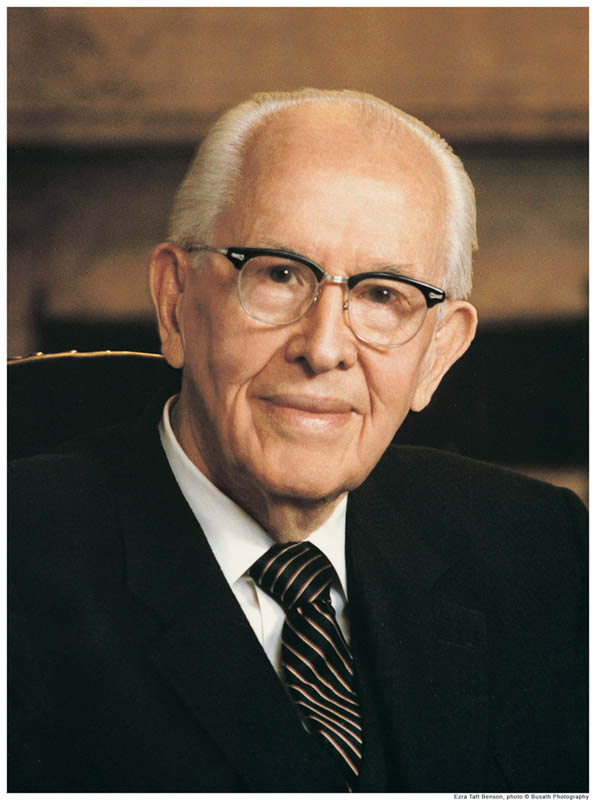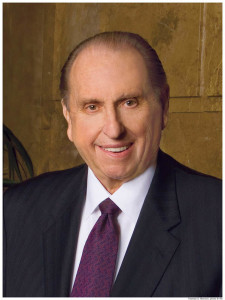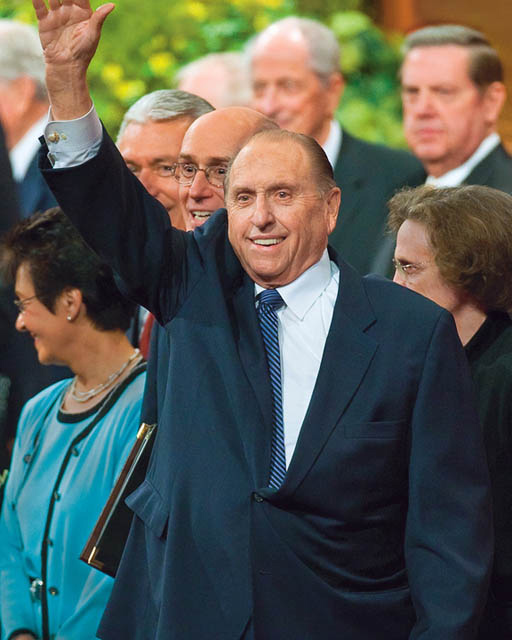With the announcement of the Catholic Pope’s retirement, some have wondered if Mormon prophets ever retire. Mormon is a nickname sometimes used to describe members of The Church of Jesus Christ of Latter-day Saints.
Mormon prophets serve for life. As of this writing, none have ever retired. However, they are supported by two counselors and twelve apostles, as well as leaders at additional levels. When a prophet does not have the health to carry out his normal duties, most of the work can be done by those who work with him. The apostles are also prophets, seers, and revelators, although they do not fulfill the role of the president of the Church. On rare occasions, there have been three counselors to help with the workload
When a prophet dies, the method for choosing a new prophet is very different from that used by most churches. There are no elections. No one campaigns for the office. No one applies for it. There is a smooth and orderly procession. As we study the Bible, we note that God always chose the prophets and there was no doubt among people of faith as to who that person would be.
In the same way, there is no question as to who will be the next Mormon prophet. In fact, Mormons know today who it will be if he is still alive when the time comes. If he is not, they know who is in line behind him.
As mentioned earlier, the Mormon prophet has two counselors. These three make up the First Presidency, which is the highest authority in church leadership. Below them in authority are twelve apostles. The counselors and the prophet are also apostles, making an actual total of fifteen apostles. Each has an assigned seniority based on when they were called to the role of an apostle.
The person with the greatest seniority is the prophet. President Monson, the current Mormon prophet, has served in the role of apostle longer than any of the others. The second most senior apostle is the president of the Quorum of the Twelve Apostles. If he is serving as a counselor, the next in seniority fills the role as the acting president of the quorum.
When a prophet dies, the First Presidency is automatically dissolved and the counselors return to their usual place in their quorums. The apostles run the church as a body with equal authority until the new prophet has been officially ordained. The apostles meet in the temple as soon as possible and two questions are presented to them. They are asked if the First Presidency should be reorganized at this time or if the Church should continue to function with the Quorum of the Twelve presiding.
After they discuss the questions, a formal motion is made and accepted. Then, if it has been decided to reorganize at this time, a unanimous decision is made to accept the highest ranking apostle as the new prophet and each one gives his testimony of the person God has chosen. The most senior apostle becomes the prophet but it is important that the apostles pray and confirm this personally before the transition is made. This leaves the selection in God’s hands, since He controls life and death and since He can send testimony through the Holy Ghost.
Once the new prophet has been ordained, a solemn assembly is held that allows the membership of the Church to sustain the new prophet. Today, these are broadcast. To sustain does not mean to vote in the temporal sense, even when it is referred to as such. Mormons do not vote on who will be the prophet. When they sustain their prophet—or any other person serving in a church position—they are agreeing to support that person in that position. They are promising God that they will honor and support this person in his role.
The new prophet prays for inspiration in choosing his new counselors. When an apostle dies, inspiration, not an election, selects the new apostle as well. In this way, the church progresses in an orderly and peaceful manner, without the drama and suspense found in many other faiths, but also without the speculation and controversy.
After Joseph Smith was murdered, there was confusion over who ought to lead the church. A number of men campaigned for the position, causing dissension and division in the church. However, there were many who understood what God had taught on this subject and a miracle confirmed this to those of faith. These people continued with the church, while those who merely sought power and honor often went on to found their own churches, most of which did not last very long.
“Men do not obtain place in this Church because they seek for it. If it were known that a man was ambitious to hold a certain office in the Church, that fact itself would lead to his defeat because his desire would not be granted unto him. This is the case with the officers of this Church. … [They] are responsible to God. God chose and nominated [them], and it is for him to straighten [them] out if [they] do wrong.” (George Q. Cannon, in Deseret Weekly, May 21, 1898, p. 708.)
Since that time, the process has continued unbroken, with church members fully informed as to how it works. You can learn about the leaders who are in succession for the presidency here:
http://www.mormonnewsroom.org/leadership-and-organization/
The late Terrie Lynn Bittner—beloved wife, mother, grandmother, and friend—was the author of two homeschooling books and numerous articles, including several that appeared in Latter-day Saint magazines. She became a member of the Church at the age of 17 and began sharing her faith online in 1992.






